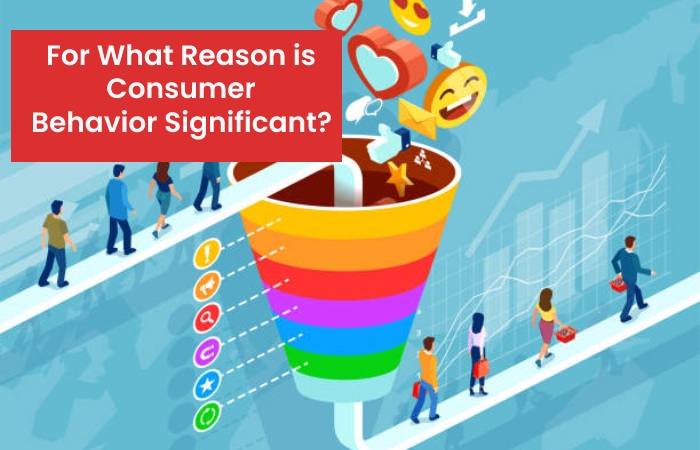Share This Article
Introduction
Consumer Behavior – Consumer conduct is the investigation of people, gatherings, or associations and every exercise related to buying, using, and removing goods and services. In addition, consumer conduct comprises how the consumer’s feelings, mentalities, and inclinations influence purchasing conduct.
Consumer conduct arose in the 1940-the 1950s as a particular sub-discipline of marketing, yet has turned into an interdisciplinary social science that mixes components from brain research, humanism, social humanities, human sciences, marketing, and financial matters.
The study of consumer conduct officially researches individual characteristics like socioeconomics, personality, ways of life, and conduct factors, trying to comprehend individuals’ needs and utilization designs. In addition, consumer conduct likewise explores the impacts on the consumer, from social gatherings like family, companions, sports, and reference gatherings, to society overall.
For What Reason is Consumer Behavior Significant?

Concentrating on consumer behavior is significant because it assists advertisers in understanding what impacts consumers’ purchasing choices. By understanding how consumers settle on an item, they can fill in the hole on the lookout and distinguish the necessary and outdated items. Concentrating on consumer behavior likewise assists advertisers with choosing how to introduce their items in a manner that produces the most significant effect on consumers.
A consumer Behavior Investigation Must Expose the Following:
- What consumers reflect and how they feel about different other options (brands, products, etc.);
- What impacts consumers to pick between different choices;
- Consumers’ behavior while investigating and shopping;
- How consumers’ current circumstances (companions, family, media, etc.) impact their behavior.
- Consumer behavior is much of the time impacted by various elements. Therefore, marketers should concentrate on consumer buy examples and sort out purchaser patterns.
There are Three Classes of Factors that Impact Consumer Behavior:
- Individual factors: an individual’s advantages and assessments can be affected by socioeconomics (age, orientation, culture, etc.).
- Mental factors: an individual’s reaction to a marketing message relies on their discernments and perspectives.
- Social factors: family, companions, instruction level, social media, and pay all impact consumers’ behavior.
Types Of Consumer Behavior
There are four focal types of consumer behavior:
1. Complex Purchasing Behavior
This behavior is a workout when consumers purchase a costly, inconsistently purchased item. They are profoundly spoken for with the buying cycle and consumers’ exploration before focusing on high-esteem speculation. For example, envision purchasing a house or a vehicle; these illustrate a mind-boggling purchasing behavior.
2. Dissonance- Reducing Purchasing Behavior
The consumer is exceptionally associated with the buying cycle yet experiences issues deciding the distinctions between brands. ‘Dissonance’ can happen when consumers stress that they will regret their decision.
3. Habitual Purchasing Behavior
The way habitual buys portrays is that the consumer has no association with the item or brand class. Envision shopping for food: you go to the store and purchase your preferred sort of bread. You are displaying a typical example, not solid brand dependability.
4. Variety Looking for Behavior
In this present circumstance, a consumer buys an alternate item not because they weren’t happy with the past but because they look for variety. Like when you are evaluating new shower gel scents.
What Impacts to Consumer Behavior?
1. Marketing Efforts
Marketing efforts impact buying choices a ton. Whenever done well and consistently, with the right marketing message, they could convince consumers to change marks or decide on additional costly other options.
2. Economic Conditions
Expensive products, particularly houses, have a significant influence. A positive economic climate makes consumers more sure and ready to enjoy buys independent of their monetary liabilities.
3. Individual Preferences
Private variables can likewise impact consumer behavior: likes, disdains, needs, ethics, and values. In enterprises like design or food, personal beliefs are powerful.
4. Group Impact
Peer pressure additionally impacts consumer behavior. What our relatives, colleagues, close family members, neighbors, and colleagues think or do can assume a critical part in our choices.
Conclusion
Hence, consumer behavior is the investigation of how individuals are pursuing buy choices to fulfill their requirements, needs or wants, and how their close to home, mental, and behavioral reactions impact the purchasing choice. Thus, to investigate consumer behavior, individuals are utilizing ideas and thoughts from different fields like brain research, financial matters, and science.
Also Read – Sponsorship – About, Type, Principles, Example and More



